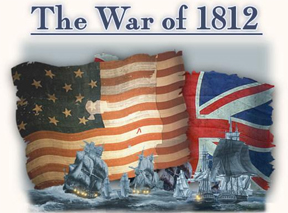By: Daniel Nardini
 Strangely enough, this year marks the 200th anniversary of the start of what would be called the War of 1812. The war between the United States and Great Britain was in fact the second war by America against the British Empire (thankfully it was also the last against Great Britain), and it was a war that was in fact primarily wanted by only some sectors of the American population. There is no question that neither side was prepared for this war. The British were more engaged in fighting against France, and the United States should have stuck to its neutrality as previous U.S. presidents George Washington and Thomas Jefferson had wanted. Maybe they were not happy with the British, but both men recognized that war with Great Britain and British North America (now Canada) was sheer folly. In fact, the war was declared by a divided U.S. Congress. Then U.S. President James Madison had sent a list of grievances against Great Britain, but he did not ask for a declaration of war. The Democratic-Republicans decided on war (the Federalists in the Congress all opposed war), and so a war resolution was barely passed.
Strangely enough, this year marks the 200th anniversary of the start of what would be called the War of 1812. The war between the United States and Great Britain was in fact the second war by America against the British Empire (thankfully it was also the last against Great Britain), and it was a war that was in fact primarily wanted by only some sectors of the American population. There is no question that neither side was prepared for this war. The British were more engaged in fighting against France, and the United States should have stuck to its neutrality as previous U.S. presidents George Washington and Thomas Jefferson had wanted. Maybe they were not happy with the British, but both men recognized that war with Great Britain and British North America (now Canada) was sheer folly. In fact, the war was declared by a divided U.S. Congress. Then U.S. President James Madison had sent a list of grievances against Great Britain, but he did not ask for a declaration of war. The Democratic-Republicans decided on war (the Federalists in the Congress all opposed war), and so a war resolution was barely passed.
The whole war for the United States as well as Great Britain was pretty much a disaster. American armies rampaged through British North America, and British armies rampaged through the United States and even burnt down Washington, D.C. There were some stunning British victories like the Battle of Bladensburg and the Burning of Washington, D.C., and some stunning American victories like the successful defenses of New York City and Balitmore and the victory at the Battle of New Orleans. Moreover the war was a stalemate, and left both sides exhausted. The war did not benefit either the British or Americans, and left parts of the United States and British North America (Canada) in ruins. The war cost the British 1,600 soldiers killed and 3,679 wounded, and for the Americans it left 2,260 dead and 4,505 wounded. No one is exactly sure how many civilian casualties there were on both sides. Aside from the poem that would become the American national anthem (The Star Spangled Banner), and the successful battle of New Orleans, the United States gained nothing from the war. The British and Canadians were able to successfully defend what would become Canada, but the British gained nothing from the war either.
The whole war, according to a consensus of many historians, could have been avoided altogether had both the Americans and the British given more emphasis to diplomacy to resolve all disputes between the two countries. Even though the United States was a good friend of France—an enemy of Great Britain at the time—this did not mean there had to be war between the United States and Great Britain. War, as the War of 1812 has shown, was a lousy option as neither side had anything to gain and more to lose. If anything positive came out of the war it is that this was the last war ever fought between the United States and Great Britain. From then on, both countries have used diplomacy to successfully negotiate any differences the two countries might have. This led to the successful negotiation of the commonly shared border between the United States and Canada—the most peacefully shared border in the world today. In the decades to come, the United States and Great Britain would go from hostile enemies to friends to fast friends and to close allies. With so much in common, this is the best thing that came out of the War of 1812. In my view the War of 1812 was a mistake that fortunately has never been repeated between the two allies.

 Rogers Park Business Alliance Expands Annual Live Love Shop Rogers Park December 18, 2025
Rogers Park Business Alliance Expands Annual Live Love Shop Rogers Park December 18, 2025

 Rep. Ford, Roy Flowers Encourage Youth to Sign Up for Boxing Classes December 18, 2025
Rep. Ford, Roy Flowers Encourage Youth to Sign Up for Boxing Classes December 18, 2025




The War That Should Really Have Never Been
By: Daniel Nardini
The whole war for the United States as well as Great Britain was pretty much a disaster. American armies rampaged through British North America, and British armies rampaged through the United States and even burnt down Washington, D.C. There were some stunning British victories like the Battle of Bladensburg and the Burning of Washington, D.C., and some stunning American victories like the successful defenses of New York City and Balitmore and the victory at the Battle of New Orleans. Moreover the war was a stalemate, and left both sides exhausted. The war did not benefit either the British or Americans, and left parts of the United States and British North America (Canada) in ruins. The war cost the British 1,600 soldiers killed and 3,679 wounded, and for the Americans it left 2,260 dead and 4,505 wounded. No one is exactly sure how many civilian casualties there were on both sides. Aside from the poem that would become the American national anthem (The Star Spangled Banner), and the successful battle of New Orleans, the United States gained nothing from the war. The British and Canadians were able to successfully defend what would become Canada, but the British gained nothing from the war either.
The whole war, according to a consensus of many historians, could have been avoided altogether had both the Americans and the British given more emphasis to diplomacy to resolve all disputes between the two countries. Even though the United States was a good friend of France—an enemy of Great Britain at the time—this did not mean there had to be war between the United States and Great Britain. War, as the War of 1812 has shown, was a lousy option as neither side had anything to gain and more to lose. If anything positive came out of the war it is that this was the last war ever fought between the United States and Great Britain. From then on, both countries have used diplomacy to successfully negotiate any differences the two countries might have. This led to the successful negotiation of the commonly shared border between the United States and Canada—the most peacefully shared border in the world today. In the decades to come, the United States and Great Britain would go from hostile enemies to friends to fast friends and to close allies. With so much in common, this is the best thing that came out of the War of 1812. In my view the War of 1812 was a mistake that fortunately has never been repeated between the two allies.